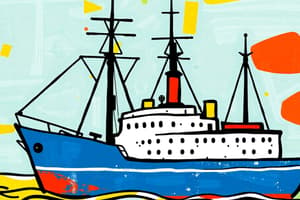Podcast
Questions and Answers
What is the primary reason why navigation must occupy first place in shipboard operations?
What is the primary reason why navigation must occupy first place in shipboard operations?
- To avoid conflicts with traffic in busy waterways
- To facilitate communication with land stations
- To ensure the crew can interpret instruments accurately
- To prevent any errors that could lead to disaster (correct)
In shipboard operations, emergency procedures were developed mainly through:
In shipboard operations, emergency procedures were developed mainly through:
- Technological advancements in maritime safety
- Strict regulations imposed by land stations
- Experience gained by sailors during voyages (correct)
- Formal classroom training sessions
What is the primary purpose of general drills conducted in shipboard operations?
What is the primary purpose of general drills conducted in shipboard operations?
- To practice navigation skills during rough weather
- To simulate abandoning the ship in real conditions
- To bring crews up to speed quickly in emergencies (correct)
- To test the crew's ability to handle fire alarms
What is a common challenge that cruise ships may face regarding passengers ashore?
What is a common challenge that cruise ships may face regarding passengers ashore?
In case of major accidents involving fuel spillage or fire damage, cruise ships are typically equipped with supplies to:
In case of major accidents involving fuel spillage or fire damage, cruise ships are typically equipped with supplies to:
What is the primary purpose of communication protocols in maritime operations?
What is the primary purpose of communication protocols in maritime operations?
Why are navigation lights on a ship considered crucial for safe operations?
Why are navigation lights on a ship considered crucial for safe operations?
What is a key role of ship repair facilities located in ports?
What is a key role of ship repair facilities located in ports?
Why is routine maintenance crucial for shipboard operations?
Why is routine maintenance crucial for shipboard operations?
In maritime transportation, what is the consequence of not paying attention to emergency preparedness?
In maritime transportation, what is the consequence of not paying attention to emergency preparedness?
Flashcards are hidden until you start studying
Study Notes
Shipboard Operations involve managing various aspects of life aboard a ship, including safety, security, food supply, recreation, and other duties related to maintaining a vessel's operational integrity. One crucial aspect is navigation, which requires both accurate instruments and skilled personnel who know how to interpret them accurately; navigation must always occupy first place because any error could lead to disaster. For example, if a boat were traveling from San Francisco to Seattle under normal conditions, its course would be calculated so as to avoid conflicts with traffic in the channel off the coast of Oregon during daylight hours when the waterways are most heavily used by ships going northward.
Emergency procedures have been developed over time through experience gained by sailors themselves during their voyages across oceans without being able to rely upon help from land stations. These procedures cover everything from abandoning ship to handling fire alarms and general drills intended for bringing crews up to speed quickly on what they need to do in emergencies. There can also be situations where passengers get lost ashore due to being left behind after disembarkation or getting mugged while walking around town; these incidents necessitate developing effective plans for dealing with such contingencies. Cruise ships typically carry supplies sufficient to keep them afloat even if there were major accidents involving fuel spillage or fire damage.
Communication protocols play another key role in safe operation since it ensures everyone knows exactly what’s happening wherever you go. Emergency broadcast systems allow captains and crew members alike to communicate important information instantly among all parties involved. Radio equipment must work properly throughout entire journeys whether out at sea, near shorelines, or even far away in harbor areas. Navigation lights serve double duty not only helping others find your location but also providing vital warnings against collisions when darkness descends.
Ship repair facilities exist within many ports today offering repair services ranging from checking seams along wooden planks coupled together with iron bolts into fits tight enough that pressure won’t cause leaks later down line unless something goes wrong unexpectedly. Such checks ensure continuity between port visits and prevent further problems cropping up due to wear and tear sustained en route. Maintenance tasks include keeping engines running smoothly so vessels don’t break down too often causing delays which might disrupt schedules significantly.
Overall, shipboard operations require meticulous attention to detail across multiple facets like navigation, emergency preparedness, communications protocols, and routine maintenance activities – each element playing pivotal roles ensuring smooth functioning of maritime transportation network globally.
Studying That Suits You
Use AI to generate personalized quizzes and flashcards to suit your learning preferences.




